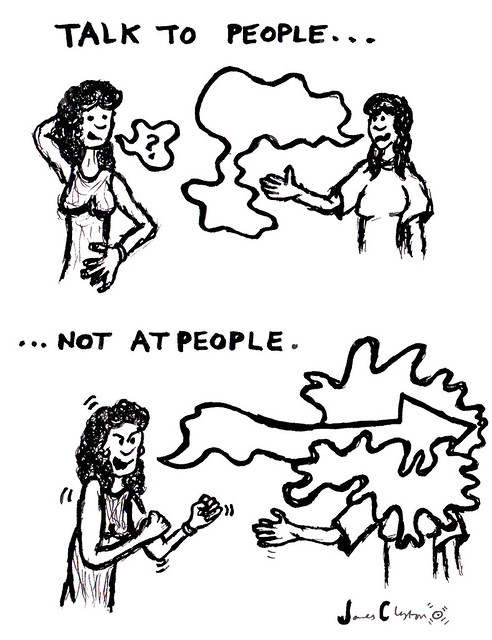Improve customer loyalty by ditching surveys and solving problems, including the silent ones
October 17, 2012Apply the Granny test to get closer to your customers
October 23, 2012True customer engagement is not based on click throughs or contests – Interview with Wendy Lea, CEO of Get Satisfaction
Following on from my recent interview, Build relationships with your customers that matter – Interview with Chris Brogan on The Impact Equation, today I am pleased to present to you an interview I did with Wendy Lea, CEO of Get Satisfaction, the leading customer engagement platform that helps companies build better relationships with their customers and prospects, through the best online customer community.
Note: Hat tip to Guy Stephens (@guy1067) for the interview suggestion and for introducing me to Wendy.
This interview makes up number thirty-one in the series of interviews with authors and business leaders that I think that you will find interesting and helpful in growing your businesses.
Below are highlights from our interview:
- The theme that runs through Wendy’s career is how organisations and individuals can build long-term, relationships that matter.
- Get Satisfaction is a customer engagement platform that allows businesses of any size build relationships with their customers wherever they are online.
- Traditionally, companies have had to reach out to their customers from inside their companies using feedback forms etc but now through the use of technology tools, like Get Satisfaction, they are able to go to where their customers are to engage and interact with them.
- We have to give huge credit to much of what is happening now to what Doc Searls talked about (Markets as conversations) in The Cluetrain Manifesto that was published over a decade ago (1999).
- What is happening around us is a ‘beautiful collision’ of our natural instincts to share and talk about things and the development of technology that allows companies to talk to customers where they are, using the platforms that they are using.
- All of this, Wendy believes, is ‘elegantly disruptive’ to our traditional way of doing business and thats why she fell in love with what Get Satisfaction is doing.
- Businesses are having to (re)learn how to do business in a more human way.
- Wendy believes that we naturally want to help each other but the change to being more customer centric or customer service led feels unnaturally hard because we have put in place too much business process and technology that acts as a barrier to a more human way of doing business.
- Also, organisational culture and the level of investment that business has in these processes and technologies acts as a barrier to change.
- Apple CEO, Tim Cook’s, recent apology about their Map App probably had a positive impact on their brand equity because it was a very human response to say sorry and to pledge to do better.
- Everyone that is involved in the Customer Relationship Management field from service providers to technology vendors to change management professionals have a responsibility to build the transparency and trust that is needed to support these new times and ways of doing business.
- This will force us not to hide behind the technology. Wendy says that ‘she doesn’t want to be the wizard behind the curtain’. The curtain needs to be pulled back so that we can be more open and able to build those personal and more human relationships.
- The world is changing around us, in front of our very eyes and business executives and business owners are looking for the ‘answer’ but there is no answer.
- Business is evolving and firms need to commit to evolution learning, being flexible, agile and collaborative.
- However, we need to be careful about some of the words that get used, like engagement and collaborative, that are being bandied about as they can get hijacked by industry players, consultants, vendors and the like.
- Get Satisfaction wants to help firms really understand what engagement means.
- Wendy doesn’t think that true engagement is clicking through an ad or being part of a contest on a fan-page.
- Those interactions can be important as part of an overall journey or relationship but they are not the whole thing.
- Engagement is very closely related to how we build relationships and has a two-way flow. Old article: Is your marketing interesting and interested?
- Sometimes, all of the talk about engagement etc is all too abstract and we need to be more pragmatic about what we can do to grow our and our clients businesses.
- Get Satisfaction connects all of a businesses web-presences so that all of the conversations that take place can be brought together and managed in one place providing ease of use, efficiency, management, insight that can be shared internally and consistency. It is a business’ conversation hub.
- Their platform also integrates with other platforms like ZenDesk (link) and Service Cloud etc
- Relationships matter. Always have and always will.
- Good relationships make good business.
About Wendy (taken from her LinkedIn profile)
An accomplished leader and passionate innovator, Wendy Lea has over 25 years of experience in the sales and marketing industry. An expert in multi-channel strategy, Wendy has served as a CEO, corporate executive, angel investor, strategic advisor and board member to dozens of innovative start-ups and public companies.
You can find out more about Get Satisfaction at their website (www.getsatisfaction.com) and connect with them on Twitter @getsatisfaction. Also, find out more about Wendy via her own website www.wendylea.com, connect with her via Twitter @WendySLea, and on LinkedIn here.
Thanks to James Clayton for the image.





30 Comments
Adrian, I think for me the part of your conversation that resonated most was
true engagement is not clicking through an ad or being part of a contest on a fan-page.
That is simply a transaction, a little like the transaction I make when I buy a coffee at the railway station.
On the other hand, when I buy a coffee at my office, I always have a chat.
Where would I rather buy the coffee?
James
Hi James,
I think you are spot on! One of the other ideas that jumped out at me from my conversation with Wendy was the idea that many of these words like Engagement are getting hijacked by vendors, agencies, professionals etc. My worry is that there are too many firms that are peddling click throughs or contest entrants as engagement. Pah! Snake oil salesmen as far as I am concerned and should be outed!
Adrian
Hi James
Thank you for your comments. At Get Satisfaction we believe that a like or a follow does not necessarily build a relationship. Having a meaningful conversation with a brand will create a lasting memory. This meaningful exchange will inspire you to buy coffee at the office rather than the train–as you mentioned–because of the relationship–not because the coffee tastes different. We’re challenging brands to look at the second generation of social–where meaningful relationship building actually happens.
-Wendy
Hi Wendy,
Thanks for your great reply and the great point you make about “challenging brands to look at the second generation of social–where meaningful relationship building actually happens.”
Bring it on!
Adrian
Hello Wendy
There are a couple of points that particularly resonate with me:
– Businesses are having to (re)learn how to do business in a more human way;
– Relationships matter. Always have and always will;
– Wendy believes that we naturally want to help each other but the change to being more customer centric or customer service led feels unnaturally hard because we have put in place too much business process and technology that acts as a barrier to a more human way of doing business.
It occurs to me that you have missed out one of the most fundamental points, the elephant in the room. What am I talking about? The conception of a person as first, foremost and sometimes exclusively as an economic object. It occurs to be that no transformation is likely in the relationship between the business and the customer until the conception of a person shifts radically.
What do you say?
At your service and with my love
Maz
Hi Maz,
Thanks for that and great point. I’ve let Wendy know about your comment and have invited her to respond as soon as she can.
Adrian
Maz,
Thanks for expressing your sentiments.
The elephant in the room? “The conception of a person as first, foremost and sometimes exclusively as an economic object. It occurs to be that no transformation is likely in the relationship between the business and the customer until the conception of a person shifts radically.”
I see a material, sustainable (and positive) shift happening between people and the product/services/companies they follow (and even have passion for).
Two points:
1. The first part of the shift is more esoteric and embodied in the transformation happening in the human condition. It seems we’re all more and more accepting of our responsibility to pursue our potential, both personally and professionally. Part of being in this unique energy is learning to tell our *truth* to ourselves, our families, friends, governments and yes even to the companies we support and buy from.
2. Another part of the shift is more pragmatic and is driven by easy, low cost access to our precious “interwebs” through smart phones and social tools, technologies and platforms.
The combo is a powerful force. Remember Doc Searls and the Clue Train Manifesto? http://www.cluetrain.com/doc.html I wonder if he foresaw Flickr, Twitter and Facebook?
Companies are no longer naive about the power and influence of the individual (customer’s) voice. Companies of all sizes, shapes and industries recognize that WOM forces are in a heightened state because of people’s inner desire to express, share (be heard) and again, activated with the touch of a button. Putting *publishing* tools in the hands of individuals has forever shaped the relationship between products/services/brands (companies) and their friends/fans/followers (customers). There’s no turning back on this cycle.
The personal transformation supported by social technologies continues to drive transparency. Transparency is a primary cornerstone for trust. And with trust, new *mutually beneficial* relationships are possible.
Sound crazy?
Wendy
Hello Adrian and Wendy
I thank you for a stimulating conversation. I have made use of our dialogue and so some research I have been doing to write the following post which kind of captures my latest thinking/stand on this topic:
http://thecustomerblog.co.uk/2012/10/29/which-of-these-3-orientations-are-you-taking-towards-customer-experience-and-customer-centricity/
I wish you both well and am grateful you exist.
maz
Hi there, after reading this awesome piece of writing i am also cheerful to share
my experience here with mates.
Thanks, Brent